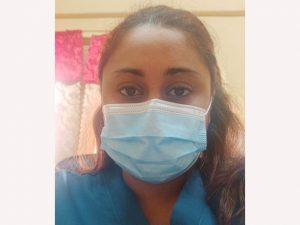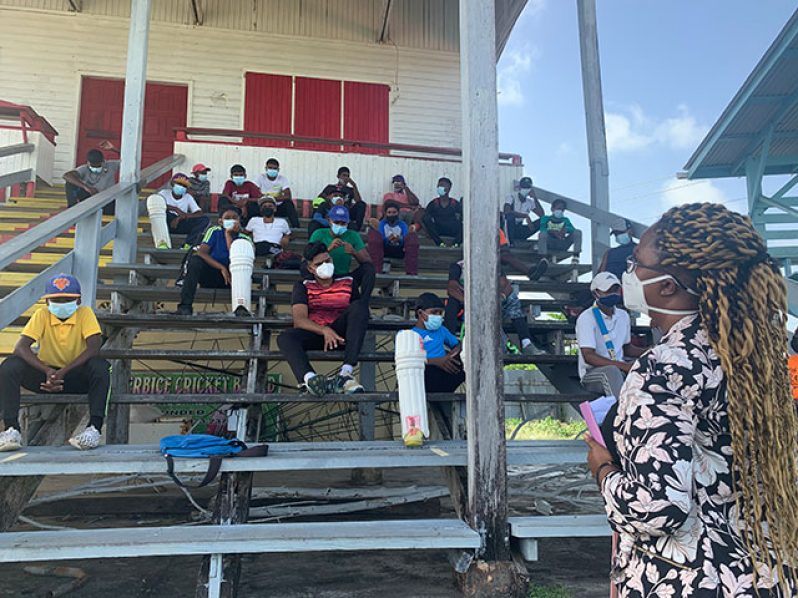-recount life of stigma, social withdrawal
FIFTY-SIX-YEAR-OLD John (not his real name), hails from a quiet community on the Upper Corentyne in Region Six. Twenty years ago, he was a vibrant and adventurous individual who used to charm the ladies with his contagious smile. However, that changed when he began to notice some physical changes to his foot. It was filaria. The vibrant John became dejected and, so, he isolated himself from society.
“I used to do everything, jump on my bicycle, run, go all over, catch birds, but now I don’t do the things I used to do before. I get friends that would come and gaff and so, but most times I would just lay down in the hammock at home. I’m comfortable with just being by myself, because of the stigma. The stigma made me withdraw completely, so you really can’t do the things you used to do before”, John explained. He was sitting on a chair in his home with both of his feet covered.

Before the physical symptoms manifested, John worked in the interior, but he had to stop. Eventually, he took up a role in the family’s bakery. Even though the swelling of his foot started many years ago, it was only five years ago that he was officially diagnosed with filaria. Since then, he has been attending the Filaria Clinic at the Georgetown Public Hospital Corporation.
John said he feels comfortable and at ease at the clinic with no watchful eyes. Even though he missed several visits, he has been actively using the CARE remedy which includes; cleaning the area, applying treatment, raising the affected area when sitting and above the level of the head when lying down, and exercise.
“When I first started, was twice a month and then six weeks after, but due to the pandemic, I didn’t go since the beginning of last year, but I will resume next week. Ms. Cheryl and the doctor make you feel so comfortable at the clinic visit,” He noted.
John’s sister describes him as an extrovert who became an introvert due to his condition. She noted that over the years, John did a good job at hiding his symptoms in an effort to avoid being judged. The sister emphasises the importance of providing 100 per cent love, affection and support to persons affected by this mosquito-borne disease.

“Don’t be ashamed of your family. They are the same persons. Love them as much. And let them not feel rejected. I am encouraging everyone, when the team is heading out, take your pills. If they don’t catch you at home, go to the health centre and collect your pills. That will help you to live a fuller life and you won’t feel rejected. Play your part in preventing yourself from having it and from spreading it,” she urged.
Meanwhile, John is pleading with persons in his region and the rest of Guyana to join the fight in the elimination of the disease. Once it can be eliminated, it would be a great accomplishment for the country and a prayer answered for him.
“Once the pills are available take it. You won’t want to reach to these stages that change your life completely. You won’t want to end up like me; this way in a corner, hiding from people. Prevention is the best way, so please take the pills. I am always praying and hoping this disease can end and no one else can get affected.”
In another community on the Corentyne Coast, 51-year-old Richard (not his real name), a suspected filaria patient, said that in early 2000, he developed an itch on his right leg followed by swelling over the years. The leg then developed a thick “elephant like” skin.
“Was an itch and it became like a small ulcer and the skin get thick, like elephant skin. Then I keep trying going from hospital to hospital, but no help. I recently learnt it could be filaria. It grow till it turn big and hard,” Richard said.
Richard, at that time, was a market vendor and had a thriving business. However, due to the stigma, he had to quit. He eventually opened a small shop at home to keep earning. Like John, the disease also forced Richard to change his lifestyle and he kept to himself.
As such, he is urging the residents of Region Six to take the pills and help to eliminate the dreadful disease.
“In my personal life, it slows me up. I had opportunities to go different places, but I turned them down because I didn’t want to be among people who will look at me differently.”
According to the World Health Organisation (WHO), Lymphatic Filariasis, commonly known as filaria, is a painful and profoundly disfiguring disease. It is caused by an infection caused by parasites classified as nematodes (roundworms) of the family Filariodidea that are transmitted through the bites of infected mosquitoes. Mosquito-transmitted larvae are deposited on the skin from where they can enter the body. The larvae then migrate to the lymphatic vessels where they develop into adult worms, thus continuing a cycle of transmission.
In communities where filaria is transmitted, all ages are affected. While the infection may occurred during childhood, visible manifestations, such as lymphedema, occur later in life, causing temporary or permanent disability.
MULTI-PURPOSE PILLS
Dr. Sadhana Samtani, the national supervisor for Region Six, explained that the Mass Drug Administration (MDA) campaign is designed to stop transmission through pills distribution and to identify chronic cases so as to manage morbidity and alleviate suffering.
She stated that in Region Six, the campaign will last for two weeks during which the Ministry of Health (MoH) personnel will be going house-to-house and at fixed points to administer the pills to persons who are eligible. These include everyone except pregnant women, children under two years and severely ill persons.
Region Six is one of the endemic regions, which means that it has enough positive cases to cause filaria transmission, hence the need for the MDA in the region.
Dr. Samtani highlighted that the triple drugs regimen, Invermectin, Diethycarbamazine (DEC) and Albendazole (ALB) also known as the IDA, is safe to use and has lots of benefits.
It would help not only in the elimination of filaria, which cannot be emphasised enough, but it also has benefits in treating scabies, lice and de-worming.
“When we take the pills, we not only protect ourselves, but we also protect our families, so prevention is better than cure. This campaign is basically a preventative measure, as you know the symptoms of filaria won’t show up immediately, it shows up 10-30 years later. We could be infected and don’t even know, so it’s really important to take the pills and it would garner enough coverage to eliminate filaria in the country,” she said.
The pills will be administered via a height-based dosing schedule and pills have to be taken in the presence of the pill distributor. Minimal transitory side effects such as headache, nausea or drowsiness may occur, but are expected to last less than 24 hours.
In 2019, during the first round of the MDA in the region, Region Six was able to achieve 75 per cent geographical coverage, an exceptional feat which paved the path for the second round of MDA, in which the region aims for over 90 per cent this time around. Field Officers, Regional Coordinators and community engagement officers have been meeting with all stakeholders and sensitising them and their constituents on the campaign and the importance of taking the pills.
Further, Clarence Charles, a Regional Coordinator and a Public Health Inspector attached to Vector Control Services, explained that a remapping survey was done in 2018, which revealed positive cases of filaria in the region. This led to the implementation of the MDA.
“I really want to see filaria eliminated from Guyana as a whole and for my region. I would like to see persons exhibiting the willingness to take their pills so they too could participate in this programme as we work to get rid of this disease. The impact on an infected person is significant and we should all make a conscious effort to support the campaign,” he said.
What is important to note, Dr. Samtani said, is that the pill distributors and Field Officers have received rigorous training.
“Everyone involved in this programme has had training from the national level to the regional level right down to the Field Officers and pill distributors and, during training, there were practical exercises and a test was done at the end,” she informed.
In conclusion, she shared her opinion on what it would mean as a healthcare provider to see the elimination of filaria in Guyana.
“Even if I wasn’t a healthcare worker, I would try with the same zeal and energy to assist to get filaria eliminated in our country. Why? Because we can look back in the years to come and say we were part of that campaign. Just like how polio was eliminated, we want to see Guyana as one of the countries that is filaria free, because it is not something that is only harmful to us, but to our generations to come, so we want to save generations ahead.”
During the MDA, all COVID-19 measures are in place while interfacing with residents. Pill distributors are easily identifiable with their purple t-shirts and hats with the Ministry of Health and PAHO logo and a badge.



.jpg)











